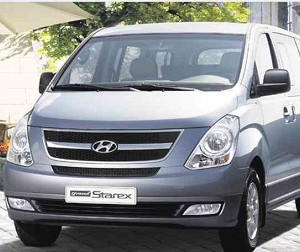
The Association of Vehicle Importers and Distributors (Avid) reported a 20-percent surge in sales of Light Commercial Vehicles (LCVs) in the first half of 2013.
Avid chair and president Ma. Fe Perez-Agudo, who is concurrently the president and CEO of Hyundai Asia Resources Inc. (Hari), said that from January to June this year, 7,524 LCV units were sold compared to 6,270 in the year-ago period.
The new models and upgrades of compact and midsize sport utility vehicles launched by Motor Image Pilipinas Inc.’s Subaru and The Covenant Car Company Inc.’s Chevrolet brands led the onslaught, she added.
Founded in July 2010 as a private, nonstock, nonprofit business association, Avid has 11 member companies representing 20 global brands in the Philippines including Audi, Chevrolet, Chrysler, Dodge, Hyundai, Jaguar, Jeep, Lamborghini, Land Rover, Maserati, Mercedes-Benz, MINI, Porsche, Subaru and Volvo.
Agudo said that the LCV segment’s positive first half performance cushioned the 18 percent decline in Avid’s passenger car (PC) sales—from 9,530 units in January-June 2012 to 7,821 January-June 2013—triggered principally by supply setbacks, particularly experienced by Hyundai and Chevrolet.

Despite the supply problems, she noted that the PC segment for the entire industry including the Chamber of Automotive Manufacturers of the Philippines Inc. (Campi) sold a total of 35,856 units in the first semester this year compared to 31,438 units in the same period last year.
“The PC segment is set to continue growing for the rest of 2013,” she declared. “The introduction of more compact and affordable cars and the abundance of easier payment schemes are factors that will drive demand for this segment.”
TREND. Asked whether she sees a significant consumer trend toward LCVs, Agudo replied that the sale of LCVs has strengthened in recent months due to new product offerings and the growth of the middle-income market.
“As emerging economies like the Philippines continue to grow, so will the demand for bigger cars (LCVs),” she predicted.
Agudo revealed that the top three LCV sellers marketed by Avid members in the first half of 2013 were the Hyundai Tucson compact SUV, Hyundai Grand Starex minivan and the Chevrolet Trailblazer midsize SUV while Hari’s top three sellers, both PCs and LCVs, were the Accent subcompact sedan, Elantra compact sedan and Tucson.
Hari sold a total of 10,992 vehicles in the first sem, making it the third best-performing automotive firm in the country after Campi leaders Toyota and Mitsubishi.
Of these 10,992 units, 40.45 percent were LCVs.
Consumers planning to buy a new car this year can look forward to the launching of five new Hyundai models before the year ends, Agudo said, without elaborating further.
ROAD MAP. As for the long-awaited Road Map of the Philippine automotive industry being prepared by the Department of Trade and Industry (DTI), Agudo said that after conducting an in-depth study on the auto industry, Avid submitted the results of the study to the DTI in October 2012.
Avid suggested four recommendations: First, a shift from a traditional incentives approach to objective-based, performance-driven and time-bound incentives to encourage firms to innovate and infuse additional investments into the industry, and thus help the auto industry to be globally competitive.
Clear-cut conditions and parameters should be established to make sure that only deserving companies are granted incentives while at the same time, companies that receive such incentives should be strictly monitored and guided by a performance management system that uses well-defined metrics.
Avid’s second recommendation is to redirect support towards the development of the parts and components industry to make the auto industry competitive and sustainable.
This move will assure assemblers that they can source locally manufactured parts and components that are at par with global standards.
It would require the development of raw materials processing facilities and testing centers for auto parts in order to reduce bottom line costs; the establishment of a system that facilitates transfer of technology to local parts manufacturers and strengthens the links between OEMs (original equipment manufacturers) and local enterprises so as to help local parts makers to address quality and delivery issues; the implementation of skills development programs to improve labor productivity and efficiency in the auto and related industries.
The third recommendation is to implement a comprehensive competition policy that fosters and nurtures more efficient markets and advances consumer welfare. This will also correct market distortions by creating a level playing field and prevent monopolies that deter market players from developing their competitive edge. A level playing field puts the consumer first because competitive market expansion will generate more and better quality choices and lower prices for consumers, as well as improve efficiency in production and allocation for producers. The impact of fair competition on price and innovation serves the interests of consumers who, at the end of the day, are the primary market movers.
FREE TRADE. Fourth, Avid recommends upholding and sustaining Free Trade Agreement (FTA) commitments which boost the competitiveness of the auto industry. Adhering to FTA commitments allows the parts and components industry to tap foreign markets for raw materials that cannot be sourced locally. FTAs open up new business opportunities for local and foreign investors via partnerships and joint ventures in and outside the country. Moreover, tariff liberalization programs aligned with FTAs have allowed the Philippines to achieve significant progress in reducing the distortion wreaked by protectionist policies across industries.
Despite the prospering used car smuggling industry that hampers the growth of CKDs and CBUs and makes the playing field unfair for legitimate players, Agudo said that strong macroeconomic fundamentals plus positive local business and consumer sentiments projected to counterweigh global and regional setbacks give industry players good reason to expect a record-breaking sales performance in 2013. “It is noteworthy that the auto industry for the first six months of 2013 posted almost 20 percent growth compared to last year, with sales estimated at around 100,000 units,” she pointed out.
“As the Philippines nears the $2,500 GDP/capita level to achieve the second wave of motorization, mass market consumers can expect a wider range of offerings from Avid members—vehicles that boast cutting-edge technology and premium service, but which are competitively priced.” Noting that Avid members recently introduced new premium brands such as Bentley and Rolls-Royce, Agudo said that “In addition, we expect the growing ultra-luxury market to attract more players in the future, making this market really competitive.”

